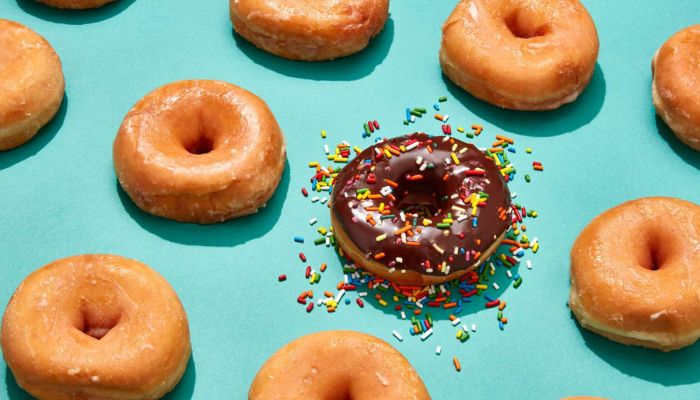As a nutritionist who has been teaching people healthy eating habits for more than seven years, I’m often asked what the differences are in calories and nutrients between everyday foods like milk and donuts. Read below about “Milk vs Donuts Calorie and Nutritional Breakdown”.
Many people are shocked to learn that a donut has a lot more calories and not as much nutrition as a glass of milk. I’ll show you the main differences between milk and donuts by comparing their calorie and nutrient counts in this post.
Difference in Calories
There are a lot of differences between milk and donuts when it comes to calories. About 122 calories are in an 8-ounce glass of 2% milk. One glazed donut, on the other hand, has about 190 calories. That donut has more than half as many calories as a full glass of 2% milk! It takes most people longer to eat one donut, and a box of twelve glazed donuts has about 2,280 calories. It would take more than 18 glasses of 2% milk to get the same number of calories. It’s clear that donuts are a great way to ruin your diet. A couple of those tasty treats adds several hundred calories that don’t do anything good for you.
Protein Amount
Protein is needed to build and repair muscle tissue, keep bones strong, and keep the immune system working right. Milk is a great way to get high-quality protein. An 8-ounce glass of milk has 8 grams of protein. On the other hand, donuts have very little protein—less than 2 grams per donut. Four donuts are needed to equal one glass of milk in terms of protein. As a nutritionist, I always tell my clients how important it is to eat foods that are high in protein. Because it has so much protein, milk is a much better choice than donuts for building muscle and satisfying hunger.
Amount of Fat
Donuts have extra calories, but most of those calories are empty because they come from fat instead of protein or other sources that make you feel full. One glazed donut has about 10 grams of fat, most of which is saturated and trans fats, which are bad for you. It is clear that eating too much saturated and trans fat raises cholesterol levels and makes you more likely to get heart disease. Milk has only 5 grams of total fat per glass and is good for your heart because it has unsaturated fats. I tell my clients that the best way to limit their saturated fat intake is to stay away from fried and highly processed foods like donuts.
Vitamin and Mineral Content
If you look at the amount of vitamins and minerals in milk and donuts, they are very different. It has a lot of potassium, calcium, vitamin D, vitamin A, vitamin B12, riboflavin, and vitamin B12. Milk has calcium and vitamin D, which are important for building strong bones and avoiding diseases like osteoporosis. Vitamin A in milk is good for your eyes, and B vitamins help your body turn food into energy. Milk also has electrolytes that are good for you, like potassium. On the other hand, donuts don’t have many minerals or vitamins. The empty calories from sugar and fat make it hard for the nutrients to get to where they need to go. As a nutritionist, I always tell people to eat whole, unprocessed foods instead of highly processed foods like donuts to get the most vitamins and minerals.
Sugar Content
The high sugar content of donuts is one of the things that worries me the most about them. There is more than 20 grams of sugar in a glazed donut, which is almost as much as a can of soda. Too much added sugar has been linked to diabetes, heart disease, fatty liver disease, and being overweight. The American Heart Association says that women should only eat 25 grams of added sugar per day and men should only eat 36 grams. That limit could be broken with just one or two donuts. There are only 12 grams of added sugar in 8 ounces of milk, even flavored milk. When I’m counseling people, I tell them to eat fewer sugary treats like donuts and more whole foods that are naturally sweet, like milk and fruit.
Fiber Amount
With less than 1 gram of fiber per donut, donuts are not a good source of fiber. Fiber helps your body digest food, keep your gut healthy, and keep your blood sugar and cholesterol levels in check. Milk also doesn’t have any fiber. But I tell my clients to drink milk with foods that are high in fiber, like oatmeal, berries, nuts, seeds, vegetables, and whole grains. If you eat a balanced, high-fiber diet and drink milk, you can get long-lasting energy. Just donuts will make your blood sugar go up and make you hungry an hour later.
Water intake
Milk is mostly water, so it’s a great drink for staying hydrated. Staying hydrated is important for all of your body’s functions, from keeping your temperature stable to delivering nutrients. Donuts don’t have much water in them, so they’re not good for you. I tell my clients to drink milk and water all day and not too much juice and soda, which can add extra sugar to their diet without helping them stay hydrated.
Conclusion
As a nutritionist, I always look at foods based on how healthy they are overall, not just how many calories they have. When you look at milk and donuts side by side, it’s clear that milk is much healthier and more nutritious. Milk’s protein, vitamins, minerals, and water help keep bones healthy, satisfy hunger, and give you energy that lasts. Besides the empty calories that quickly raise blood sugar, donuts don’t have much nutritional value. Donuts have a lot of calories, sugar, and unhealthy fats that can make it hard to lose weight and hurt your health in the long run.
Of course, you don’t have to stay away from any food if you eat it in moderation as part of a healthy diet. Milk, on the other hand, is a much better daily choice than donuts. I tell my clients that donuts shouldn’t be a daily habit, but rather a treat a few times a month. Making smoothies for breakfast with milk, fruit, nuts, and seeds is a much healthier way to start the day than eating donuts.
As a nutritionist, I’ve seen many clients improve their health, energy, and waistlines by replacing processed foods like donuts with whole, nutrient-dense foods like milk. When you have to choose between milk and donuts, remember this comparison. If you choose milk, your body will thank you. If you have any more questions about nutrition, please let me know.

Pooja Bohra is a certified nutritionist with over 8 years of experience in the field. At UnderCalories.com, she specializes in creating personalized dietary plans and promoting sustainable health practices, grounded in evidence-based research. Pooja is dedicated to helping individuals achieve their wellness goals. Follow her on Instagram for the latest tips and insights on balanced nutrition and healthy living.

